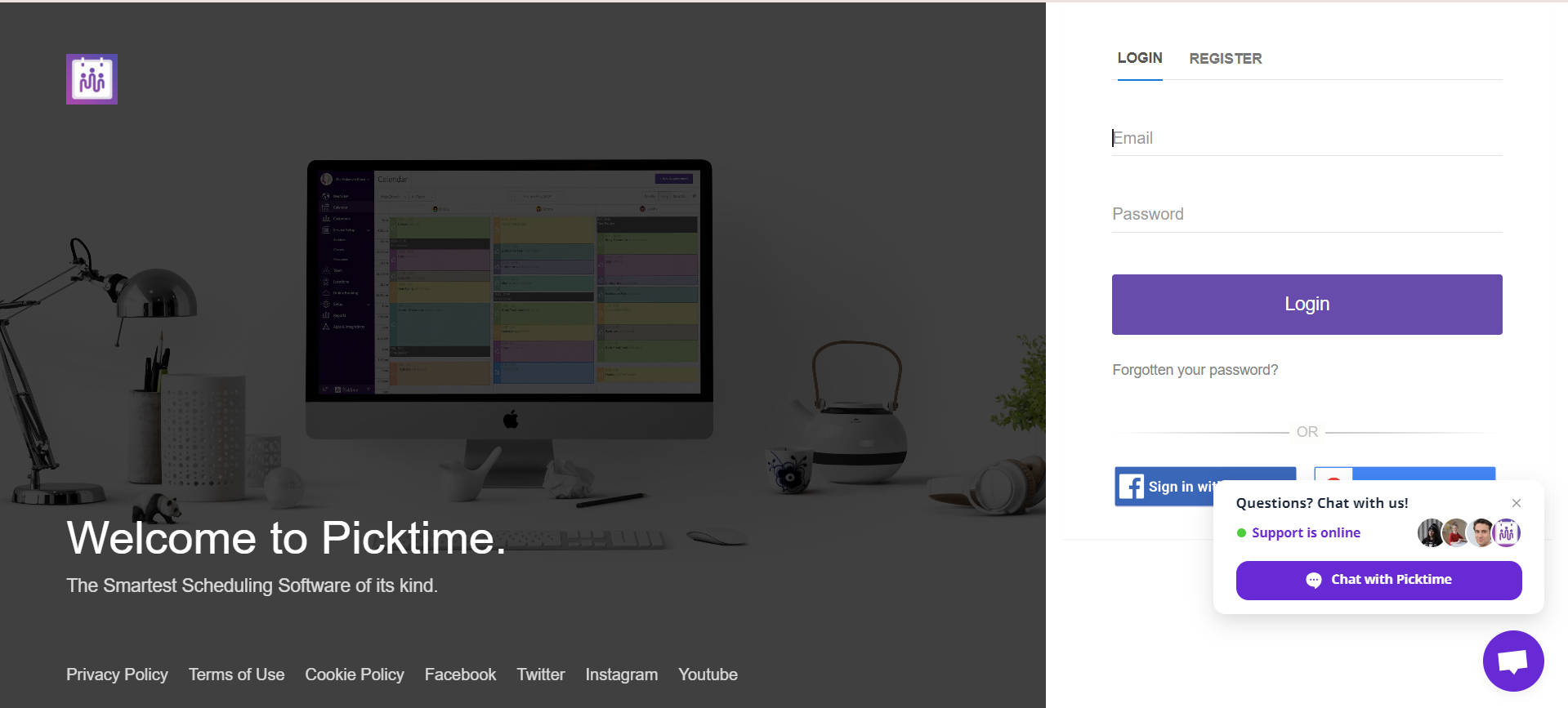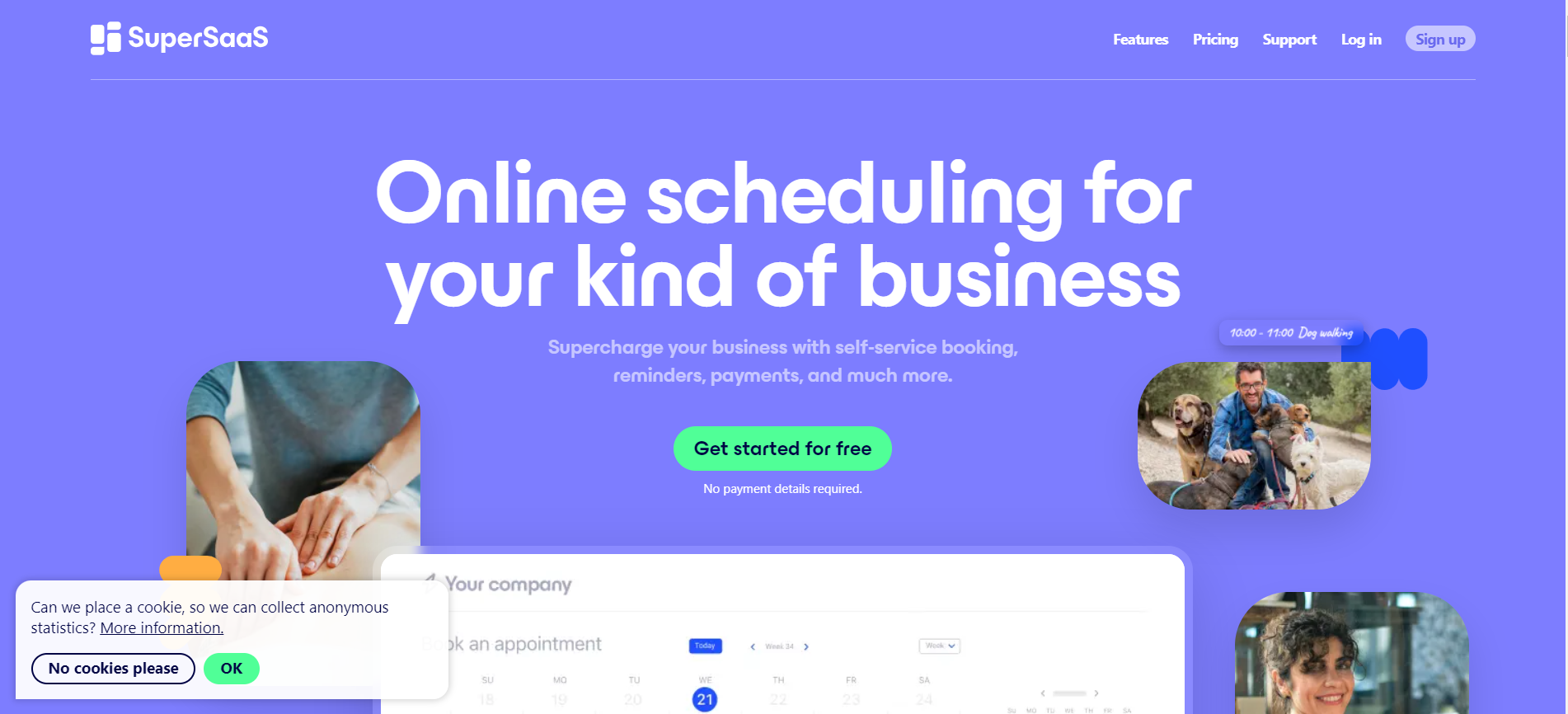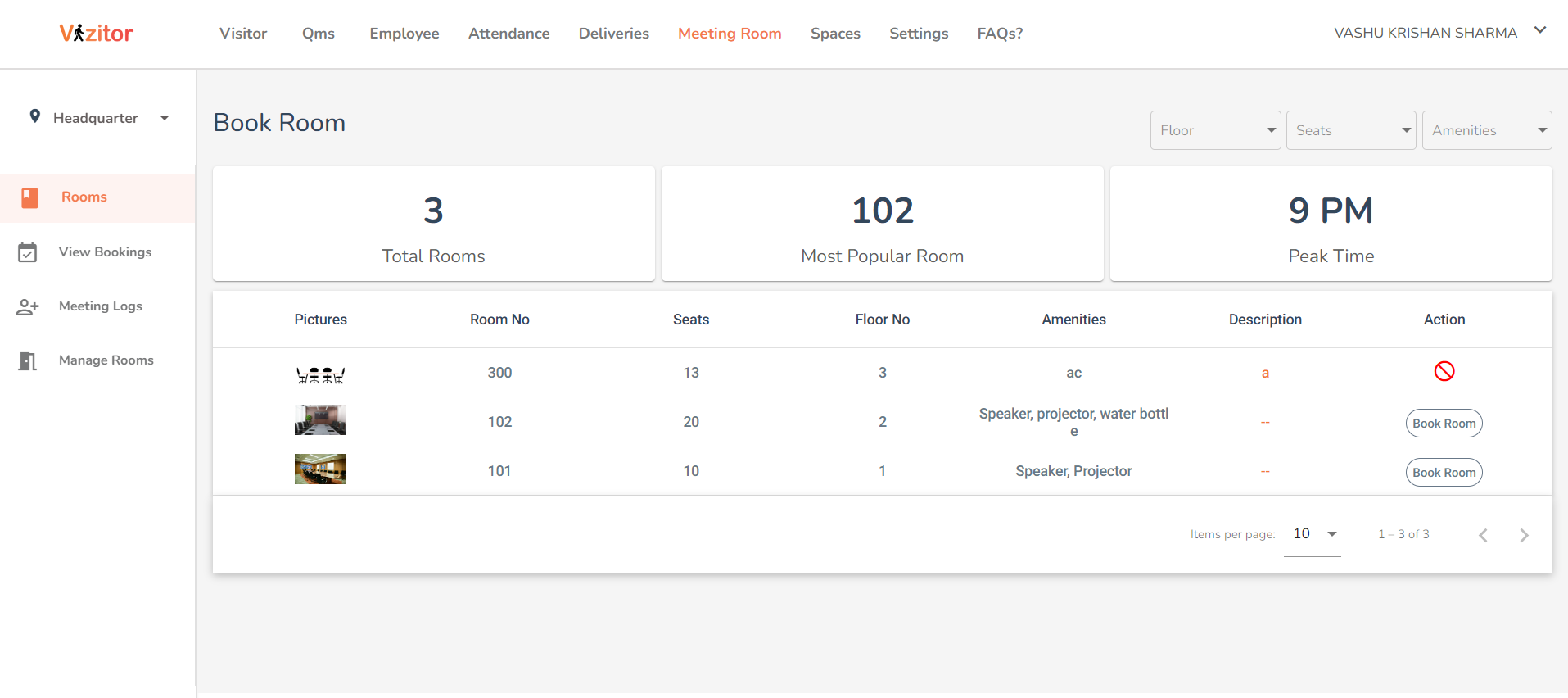Table of Content
Try Vizitor for Free!

Thu, Mar 27, 2025
Read in 9 minutes
In today’s fast-paced work environment, the efficiency of meeting room utilization can significantly impact productivity. Leveraging free and open-source software for managing these spaces can be a game-changer for businesses looking to optimize operations without additional costs. This blog explores the top free and open-source meeting room booking systems, offering organizations a variety of tools to enhance their workspace management.
Introduction to Meeting Room Booking Systems
Effective meeting room management systems help organizations maximize their space utilization, reduce administrative overhead, and improve user experience. The adoption of such systems can simplify the process of reserving spaces, ensuring that all resources are used efficiently and that double bookings are avoided.
As businesses shift to hybrid and remote work environments, efficient meeting room booking becomes crucial. Whether you’re managing a large office, coworking space, or small team, having the right software in place ensures streamlined workspace management.
Planning meetings can be a logistical nightmare. Between finding an available room, coordinating schedules, and ensuring everyone has what they need, precious time slips away. Thankfully, free and open-source meeting room booking systems come to the rescue! These software solutions offer powerful features without the hefty price tag.
Why Choose an Open Source Meeting Room Booking System?
Open-source meeting room booking systems offer two primary advantages: cost-effectiveness and flexibility. Organizations can customize these systems according to their specific needs without the hefty price tag of proprietary solutions. Moreover, the community-driven nature of open-source software often means that these systems are continually improved and updated.

Open-source software boasts two key advantages:
• Customization: Open the code and tailor the system to your specific needs. Add features, modify layouts, and create a booking experience that perfectly complements your workflow.
• Cost-Effectiveness: Save money! No licensing fees or hidden costs – just a free, downloadable solution ready to streamline your meeting madness.
Top 6 Free and Open-Source Meeting Room Booking Systems (2025)
Free and open-source meeting room booking systems offer a powerful solution for organizations of all sizes. They help streamline scheduling, eliminate double bookings, and boost overall workplace productivity. Let’s dive deeper into six of the most popular options, providing a comprehensive overview to help you choose the perfect fit:

1. Roombelt: Simple & Lightweight Open Source Room Booking System
Ideal for: Small Businesses and Teams
Roombelt shines with its user-friendly interface and focus on core functionalities. It excels in:
• Simple Booking: Schedule meetings in a few clicks with a clean and intuitive interface.
• Real-time Availability: Quickly see which rooms are free and book the perfect space for your needs.
• Easy Setup: Get started quickly with minimal technical knowledge required.
• User Feedback: “Great for basic needs. Lightweight and easy to set up.”
Roombelt caters perfectly to startups or small teams seeking a straightforward booking solution. Software Link: https://roombelt.com/

2. Hubbion: Visually Appealing Open Source Meeting Room Scheduler
Ideal for: Design Agencies and Creative Teams
Hubbion goes beyond basic booking, offering a visually stunning platform with:
• Drag-and-Drop Scheduling: Effortlessly schedule meetings with a user-friendly drag-and-drop interface.
• Modern Design: Enjoy a sleek and modern aesthetic that complements creative workspaces.
• Customizable Views: Tailor the room list to display the information most relevant to your team.
• User Feedback: “Modern look and feel, but some users report occasional bugs.”
Hubbion’s visual appeal and intuitive interface make it ideal for design agencies and creative teams who value aesthetics.
Software Link: https://hubbion.com/

3. Picktime: Integration Powerhouse for Seamless Room Scheduling
Ideal for: Businesses with Existing Collaboration Tools
Picktime integrates seamlessly with popular platforms, streamlining your workflow:
• Calendar Integrations: Connect effortlessly with Google Calendar, Outlook Calendar, and others.
• Communication Tool Integrations: Integrate with communication tools like Slack or Microsoft Teams for real-time updates.
• Automated Reminders: Reduce missed meetings with automated reminders sent to attendees.
User Feedback: “Integration capabilities praised, user interface can be cluttered.” Picktime is a powerful choice for organizations heavily reliant on existing collaboration platforms.
Software Link: https://www.picktime.com/login

4. DeskFlex: The Multipurpose Self-Hosted Booking System
Ideal for: Coworking Spaces and Offices with Diverse Needs
While DeskFlex offers paid features, its free core functionality is robust:
• Multi-purpose Booking: Book not only meeting rooms, but also desks, equipment, and other resources.
• Flexible Use: Adapt the system to your specific needs with a high degree of customization.
• Resource Management: Track and manage all your workspace resources efficiently.
User Feedback: “Flexible and adaptable, but requires some technical know-how.” DeskFlex caters perfectly to coworking spaces or offices with diverse needs for booking a variety of resources.
Software Link: https://www.deskflex.com/

5. SuperSaas: Enterprise-Ready Room Reservation System
• Ideal for: Large Enterprises and Organizations with Multiple Locations
SuperSaas is a robust platform built for large-scale needs:
• Scalability: Handles large teams and complex scheduling scenarios across multiple locations.
• Advanced Features: Offers features like user permissions, reporting, and custom branding.
• Customization: Tailor the system to your specific workflow with advanced customization options.
• User Feedback: “Highly scalable, but requires more technical expertise to set up.”
SuperSaas is ideal for large enterprises that require a feature-rich, scalable solution for managing meeting rooms across multiple locations.
Software Link: https://www.supersaas.com/

6. SimplyBook.me: Freemium Hybrid Meeting Room & Appointment Tool
While not strictly open-source, SimplyBook.me offers a free plan with valuable features:
Meeting Room Booking: Schedule meetings and manage room availability.
• Appointment Scheduling: Offer appointment booking alongside meeting rooms (perfect for client meetings).
• Online Payments: Accept online payments for appointments directly through the system (free plan has limitations).
• User Feedback: “Easy to set up and use, limited customization in the free plan.”
SimplyBook.me is a great option for businesses offering appointments alongside meeting spaces. The free plan provides basic functionality, with paid plans offering additional features.
Software Link: https://simplybook.me/booking-system-features.

How to Choose the Right Open Source Meeting Room Booking System
Consider your organization’s size, technical expertise, and specific needs when selecting a booking system. This comprehensive look at six popular options, alongside Vizitor Room Scheduling System, empowers you to make an informed decision and transform your meeting room scheduling into a streamlined success!
Here’s a breakdown of key considerations to guide your choice:

Features:
• Core Functionality: Focus on essential features like room booking, real-time availability, and integrations with your calendar or communication tools.
• Advanced Features: Consider additional features like resource booking (projectors, whiteboards), custom space booking for unique areas, and digital check-in logs for tracking space utilization.
• Visitor Management: Does the system integrate with visitor management tools to streamline the process for guests?
• Technical Expertise: Evaluate your team’s technical skills. Open-source options like Roombelt or Hubbion offer a user-friendly experience, while others like DeskFlex or SuperSaas may require more technical knowledge for setup and maintenance.
• Scalability: Consider your organization’s size and future growth. Will the system accommodate your needs as your team expands or you open new locations?
• User Interface: Prioritize a user-friendly interface for both administrators and users. A clean and intuitive design ensures smooth booking and reduces training time.
Vizitor Room Scheduling System – A Smarter Alternative
Vizitor offers a comprehensive suite of features designed to streamline your meeting room management:

• Multi-platform Booking: Reserve rooms from your phone, email, desktop, or directly on room booking panels.
• Custom Space Booking: Manage all your office spaces, including conference rooms, huddle areas, and even desks. Vizitor keeps track of availability and helps you find the perfect spot for your needs.
• Resource Booking: Book essential resources alongside meeting rooms, ensuring everything you need is available for a productive session.
• Limitless Categories: Go beyond traditional meeting rooms. Vizitor can manage desk booking, parking spaces, or any other space category you require.
• Smart Booking and Availability: Enjoy a seamless booking process with real-time availability checks. Book directly through the user-friendly app or web interface.
• Digitalized Check-in Logs: Track user check-in and check-out for all spaces. Generate reports to analyze space usage and optimize your office layout.
Remember:
The ideal system caters to your specific needs and complements your existing workflows. Consider a free trial or demo to explore different options before making a decision. With the right tools in place, you can say goodbye to scheduling chaos and hello to a more organized and productive work environment!
Getting Started and Best Practices
• Technical Expertise: Consider your team’s technical skills while picking a system. Some require more setup knowledge than others.
• Community Support: Many open-source projects have active communities that offer support and troubleshooting assistance. Utilize online forums or wikis.
• Data Security: Since you’ll be hosting the software yourself, ensure you have proper data security measures in place.
Best Practices for Deployment
• Define User Roles: Assign roles to admin, and employee to manage access and permissions within the system.
• Integrate with Calendars: Connect your booking system with the existing Google Calendar for seamless scheduling.
• Set Up Notifications: Implement automated reminders for bookings to keep everyone informed and on track.
• Gather Feedback: Encourage user feedback to identify areas for improvement and optimize your booking experience.
FAQs – Everything About Open Source Meeting Room Booking
What is the best free meeting room booking system?
Roombelt and Hubbion are popular free options. They’re easy to install, lightweight, and great for small businesses.
Is there an open-source tool for office room scheduling?
Yes, tools like Hubbion and DeskFlex allow offices to manage room reservations with customizable features.
Can I host my own booking system?
Absolutely. Self-hosted systems like DeskFlex give you full control over features and data privacy.
Do these systems support calendar integrations?
Many, like Picktime and SimplyBook.me, integrate with Google Calendar and Outlook for seamless scheduling.
Is Vizitor open-source?
Vizitor is not open-source but offers a cloud-based SaaS model with enterprise-grade room booking and visitor management features.
Conclusion
Whether you’re a startup seeking a lightweight solution like Roombelt or a large organization needing the power of Vizitor or SuperSaas, there’s a room booking system for every use case.
Free and open-source options offer flexibility and control, but they may require more setup and ongoing management. On the other hand, platforms like Vizitor deliver plug-and-play convenience, real-time data, and secure scalability—ideal for future-ready workplaces.
Ditch manual scheduling, avoid double bookings, and streamline your office with the right tool.
About the Author
Ritika Bhagat is a workplace technology specialist and SaaS content strategist. She has helped transition to digital space management platforms and enjoys simplifying complex tech topics into practical, action-driven content.










